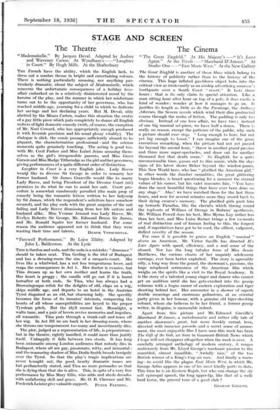STAGE AND SCREEN The Theatre
"Mademoiselle." By Jacques Deval. Adapted by Audrey and Waveney Carten. At Wyndham's "Laughter in Court." By Hugh Mills. At the Shaftesbury THE French have the ability, which the English lack, to dress out a sombre theme in bright and entertaining colours. There is nothing particularly amusing, nor anything par- ticularly dramatic, about the subject of Mademoiselle, which concerns the unfortunate consequences of a holiday love- affair embarked on in a relatively disinterested mood by the heroine of the play, and the manner in which her misfortune turns out to be the opportunity of her governess, who has reached middle-age, yearning for a child to which to dedicate her savings and her declining years. But M. Deval, ably abetted by the Misses Carten, makes this situation the centre of a gay little piece which puts completely to shame all English writers of light domestic comedy (with, of course, the exception of Mr. Noel Coward, who has appropriately enough produced it with feverish precision and his usual glossy vitality). The dialogue is slick, the comic passages sufficiently absurd to be piquant, the characterisation professional—and the solemn moments quite genuinely touching, The acting is good too, with Mr. Cecil Parker and Miss Isabel Jeans amusing them- selves . as the girl's irresponsible parents, and Miss Greer Garson and Miss Madge Titheradge as the girl and her governess, giving performances of a quite different order of distinction.
Laughter in Court is a very English joke. Lady Reeve would like to divorce Sir George in order to remarry her former husband. Sir James Granville would like to marry Lady Reeve, and being President of the Divorce Court (sic) promises to do what he can to assist her suit. Court pro- cedure, is somewhat cumbrously parodied (the main prop of comedy being the romantic letters written to her ladysnip by Sir James, which the respondent's solicitors have somehow secured), and the play ends with the great surprise of the suit failing and Lady. Reeve dismissing from her life suitors and husband Alike. Miss Yvonne Arnaud was Lady Reeve, Mr. Evelyn Roberts Sir George, Mr. Edmond Breon Sir James, and Mr. Ronald. Squire her former husband. For some reason the audience appeared not to think that they were
wasting their time and talents. DEREK VERSCHOYLE.
"Farewell Performance." By Lajos Zilahy. Adapted by John L. Balderston. At the Lyric Tins is Sardou and soda, and the soda is a mistake; " drammer " should be taken neat. Tina Gerling is the idol of Budapest and has a dressing-room the size of a racquets-court. She lives like a whirlwind, has a not less tempestuous lover, and reaps the consequences in Act 1. Her doctor is evasive, but Tina dresses up as her own mother and learns the truth. Her heart is groggy ; the candle will go out if it is burnt hereafter at both ends. So Tina, who has always had a Brawningesque relish for the delights of old, claps on a wig, skips middle age, and departs to an hotel in the Austrian Tyrol disguised as an eld, but charming lady. She speedily becomes the focus of its inmates' interests, conquering the hearts of all whose susceptibilities are keyed to the proper Tyrolean pitch. But the idyll cannot last. Moonlight, a waltz tune, and a pair of lovers revive memories and impulses, all romantic. Tina puts through a trunk-call and tears off her wig. In Act III we are back in her dressing-room, where she throws one temperament too many and incontinently dies.
The plot, judged as a representation of life, is preposterous ; but in the theatre, rightly handled, it could more than justify itself. Unhappily it falls between two stools. It has long been axiomatic among London audiences that nobody dies in Budapest, where all are gay, passionate, witty, and immortal ; and the reassuring shadow of Miss Dodie Smith broods benignly over the Tyrol. So that the play's tragic implications are never brought out, the good, heaity dramatic issues are but perfunctorily stated, and Tina no more persuades us that she is dying than that she is alive. This, in spite of a very fine performance by Miss Mary Ellis, who adds and sheds decades with unfaltering skill and grace. Mr. 0. B. Clarence and Mr. Frederick Leister give valuable support. PETER FLEMING.










































 Previous page
Previous page